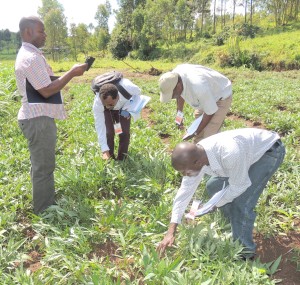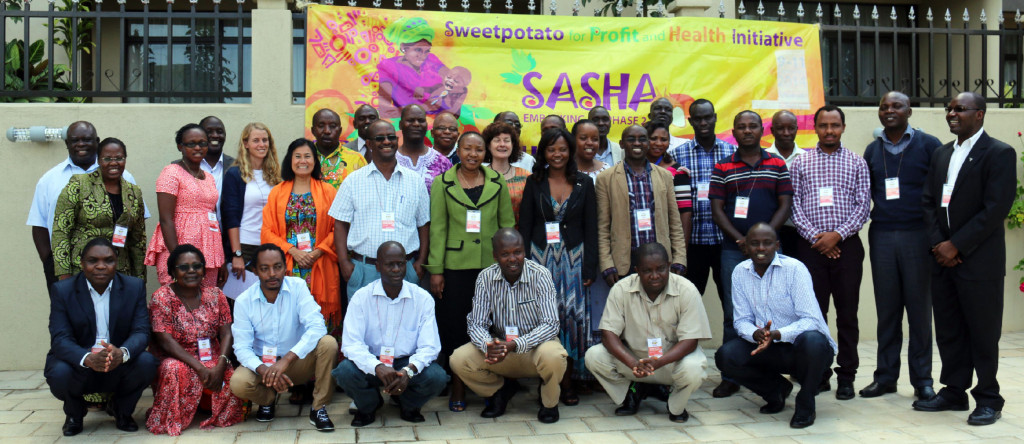In his remarks he noted that quality seed is the starting point for any successful agricultural venture and emphasized that a functioning sweetpotato seed system will contribute towards food security and income generation especially for female farmers who are the majority growers of the crop. The Director General highlighted quality assurance and the need for developing seed standards but cautioned against over-regulation and bureaucracy that could stifle emerging seed entrepreneurs. Below are some of the key highlights from the meeting.
Sharing experiences through learning routes
A Learning Route is a planned journey with learning objectives that are designed based on i) the knowledge needs of development practitioners that are faced with problems associated with rural poverty and, ii) the identification of relevant experiences in which local stakeholders have tackled similar challenges in innovative ways, with successful results and accumulated knowledge which is potentially useful to others. The Route allows for the experiential encounter between travelers and hosts, both having mutually useful experiences and knowledge. For more information on LRs, visit www.africa.procasur.org.
On 29 April 2015, participants had the opportunity to go on one of the following learning routes, which they had preselected, based on their learning interest:
Understanding farmer multipliers experiences in using low cost net tunnel to protect basic planting material from attack by virus vectors

KOTEMU group produces clean sweetpotato planting material, a business it started in the year 2011. As decentralized vine multipliers (DVMs) the group produced 246,800 vines between 2011 and 2014. . At first, the group undertook only rapid multiplication, but after realizing that the plants were being attacked by pests and viruses, the members adopted the net tunnel technology with the support of CIP. The first net tunnel was constructed in 2012, and two more in May 2013, and planted with Kabode and Vita OFSP varieties.
During the visit, the CoP members learnt how the net tunnels are managed, and discussed e business case of using net tunnels. The DVMs explained that sales were dependent on the type of buyer, with the vine multipliers paying 5 Rwandese Francs per cutting and root producers paying 2 Rwandese Francs per cutting. The cost recovery of building expenses is fast, and can happen after the first sale of vines. The DVMs also said that they could sell up to five times per year, depending on how they managed the net tunnels. The multipliers were willing to pay the total costs (Rwf 30,000 = USD 42) of establishing new net tunnels. This is because they understand that net tunnels contribute to the quality of planting material.
At the end of the visit, the CoP delegation identified research areas to pursue in regard to the net tunnel technology. These include finding alternative materials for net construction, exploring management options that would reduce or minimize weeding, and finding out how different varieties responded to net tunnel technology. They also identified individual action points that they would implement in their own countries.
Seed Systems CoP members learn how to carry out inspection of sweetpotato Quality Declared Seed (QDS)

In 2010 the Food and Agriculture Organization (FAO) of the UN developed standards for production of quality declared planting material for vegetatively propagated crops (VPCs) including sweetpotato. It was envisioned that implementation of the standards would reduce yield losses and disease propagation due to recycling of planting material. However, domestication of these standards requires stakeholders to take into account specific country contexts.
A section of the delegates attending the seed system CoP meeting conducted an inspection of planting materials owned by Dufatanye farmer group located in Southern Province, Muhanga District, Rwanda. They used protocols and standards developed by Tanzania. Tanzania is in an advanced stage of approving standards for various seed classes for VPCs. To the majority of the team the procedure of QDS inspection was new but they noted it is an important tool that DVMs can use to produce quality planting material. All plots and varieties inspected met acceptable standards. One of the challenges noted was land scarcity which does not allow effective rotations. The team proposed that this can be overcome if different farmers are involved in multiplication at different seasons.
Further, the CoP team noted that translating the QDS protocols into local languages will make it easier to implement. Additionally, close monitoring and technical backstopping by extension staff is required. Price difference between inspected and non-inspected material and whether DVMs are able to get more profits from QDS was also discussed. It was noted that QDS can provide increased income for the DVMs if farmers are made aware of the importance of quality planting material.
Rubona Research Station: Enhancing farmers’ access to clean sweetpotato planting material through tissue culture
Led by Jean Ndirigwe, head of the sweetpotato program in RAB, the team toured the tissue culture lab, hardening shade, screen house, nurseries and open field multiplication sites. They noted that nomenclature of the products and especially the distinction between basic and pre-basic seed is not clear. They also expressed concerns about sustainability of seed business in public institutions, noting that many were not commercialized. They identified revolving funds as a potential model for ensuring sustainability. In addition, they suggested the need to explore embryogenesis and bioreactor technology as possible ways of increasing multiplication rates.


1 Comment. Leave new
Great work done by the admiñistrator. I am Odokonyero Vincent Brian coordinator CIP in project being implemented in Kitgum Pader and Lamwo Districts in Uganda.
Thanks.